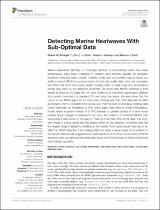Detecting marine heatwaves with sub-optimal data
| dc.contributor.author | Smit, Albertus | |
| dc.date.accessioned | 2023-01-12T07:30:09Z | |
| dc.date.available | 2023-01-12T07:30:09Z | |
| dc.date.issued | 2019 | |
| dc.identifier.citation | Schlegel RW, Oliver ECJ, Hobday AJ and Smit AJ (2019) Detecting Marine Heatwaves With Sub-Optimal Data. Front. Mar. Sci. 6:737. doi: 10.3389/fmars.2019.00737 | en_US |
| dc.identifier.issn | 2296-7745 | |
| dc.identifier.uri | http://hdl.handle.net/10566/8290 | |
| dc.description.abstract | Marine heatwaves (MHWs), or prolonged periods of anomalously warm sea water temperature, have been increasing in duration and intensity globally for decades. However, there are many coastal, oceanic, polar, and sub-surface regions where our ability to detect MHWs is uncertain due to limited high quality data. Here, we investigate the effect that short time series length, missing data, or linear long-term temperature trends may have on the detection of MHWs. We show that MHWs detected in time series as short as 10 years did not have durations or intensities appreciably different from events detected in a standard 30 year long time series. | en_US |
| dc.language.iso | en_US | en_US |
| dc.publisher | Frontiers | en_US |
| dc.subject | marine heatwaves | en_US |
| dc.subject | sea surface temperature | en_US |
| dc.subject | sub-optimal data | en_US |
| dc.subject | time series length | en_US |
| dc.subject | missing data | en_US |
| dc.title | Detecting marine heatwaves with sub-optimal data | en_US |
| dc.type | Article | en_US |

